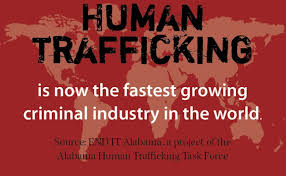
Human Trafficking in Alabama: A Consequence of Our Porous Southern Border
Porous Southern Border: The unchecked vulnerabilities of our southern border serve as gateways for drug cartels, which not only engage in narcotics trade but have expanded their operations into the horrifying realm of human trafficking.
Cartel's Multifaceted Operations: Beyond drug trafficking, cartels are increasingly involved in both sex and labor trafficking. These criminal organizations exploit human lives as commodities, using methods ranging from deceitful lures of a better life to direct coercion.
Alabama's Strategic Vulnerability: Alabama's location, specifically the stretch of I-20 between Atlanta and Birmingham known as the 'Sex Trafficking Highway', places the state in a particularly vulnerable position to trafficking operations.
Local Initiatives and Challenges: While entities like the Cullman County Human Trafficking Task Force actively combat trafficking at the local level, they face challenges stemming from broader national issues, notably the unchecked activities of cartels across the border.
Imperative for Border Security: To significantly reduce human trafficking in Alabama and the broader U.S., there's an urgent need to bolster southern border security, implement stringent measures against cartels, and adopt effective immigration policies.
In the intricacies of challenges facing our great state of Alabama, and indeed our nation, there lies a deeply concerning thread: human trafficking. It's time we draw a direct line connecting the surge in human trafficking within our borders to the unchecked vulnerabilities of our southern frontier.
Every unsecured mile of our border represents not just a potential illegal crossing, but also a gateway for drug cartels, known now not just for narcotics, but for their expansion into the heinous world of human trafficking. With increasing frequency, these cartels leverage human lives as commodities, ensnaring them into cycles of coercion, exploitation, and despair, while profiting in the billions.
Sex trafficking isn't just about force; it's about deceit and false promises, most alarmingly seen in north Alabama. Chairperson Kathy Wilson and Ashley Dover of the Cullman Human Trafficking Task Force have highlighted the grave discrepancies between the cinematic depictions and our local reality. Instead of international abductions, we see a horrifying spike in child pornography, children traded to settle drug debts, and more, all happening under the vast shadow of drug cartels.
The Code of Alabama distinctly defines the crimes of human trafficking, breaking them down into first-degree offenses, which address knowingly subjecting another person to labor or sexual servitude through coercion or deception, and second-degree offenses that cover profiting from or participating in such ventures. However, while the legal language is comprehensive, it possesses potential deficiencies. For one, the current stipulations may not have enough deterrent measures for first-time offenders. More notably, there isn’t sufficient emphasis on the collaboration or partnership of traffickers with larger networks, often spanning across states or international borders. This oversight can hinder the state’s ability to counteract the growing influence of organized crime syndicates and cartels. Strengthening the code to encompass broader trafficking networks and ensuring penalties that are proportionate to the grievous nature of the crime can better position Alabama in its fight against human trafficking.
The tentacles of these cartels stretch far, enabled by our porous border. Their operations are multifaceted: from sex trafficking to modern-day slavery in the form of labor trafficking. These victims, often lured with the promise of a better life in America, find themselves trapped in debt bondage, forced labor, and involuntary servitude.
Alabama's strategic position between Atlanta and Birmingham on the I-20, known as the 'Sex Trafficking Highway', intensifies our vulnerability. Our state might statistically rank lower in human trafficking incidents, but the looming specter of these cartels means we can't rest easy.
However, not all is bleak. The Cullman County Human Trafficking Task Force, as do many across the state, works tirelessly to combat this evil. Their alliance with local agencies, the police, and global entities like A21 is commendable. But they need our help. Every citizen can play a role: from supporting the task force, to educating oneself, to becoming a vigilant watchdog in our communities.
But beyond these local efforts, there's an even greater imperative: fortifying our southern border. Addressing the root cause is paramount. By bolstering border security, cracking down on cartels, and implementing effective immigration policies, we can strangle the avenues these trafficker’s exploit.
To conclude, while human trafficking is a global menace, the unchecked vulnerabilities of our southern border exacerbate its presence in Alabama.